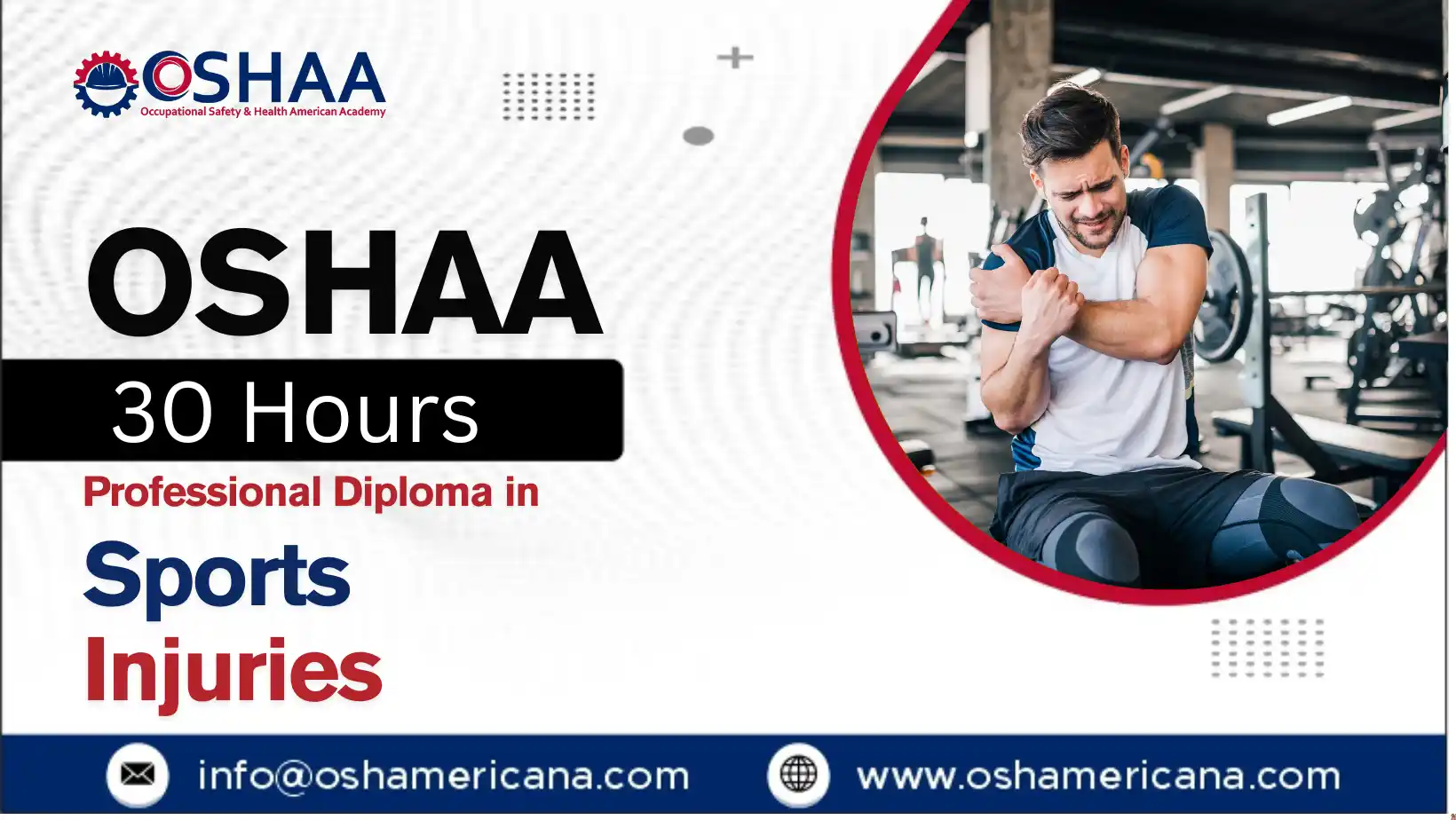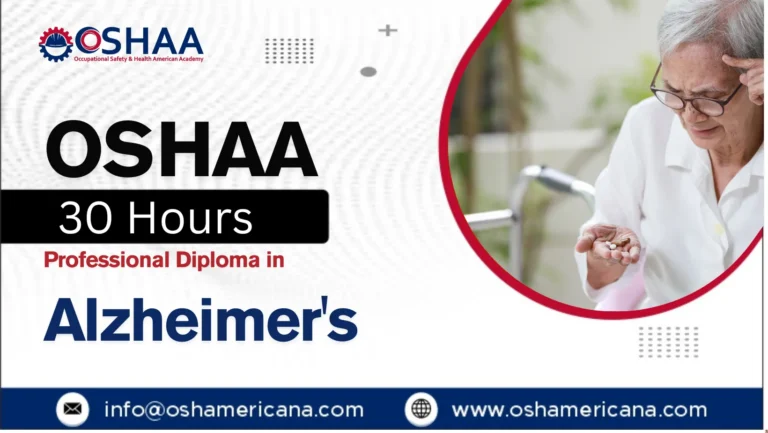Diploma in Sports Injuries – Master Injury Prevention and Recovery
The OSHAA 30-Hours Professional Diploma in Sports Injuries is designed for those seeking to develop a comprehensive understanding of injury prevention, management, and rehabilitation in athletic and fitness settings. Whether involved in coaching, personal training, or athletic care, this course equips participants with the essential knowledge and practical insight to recognise, respond to, and support recovery from common sports-related injuries.
Injury is an unavoidable aspect of physical activity, yet with the right skills and training, its risk can be significantly reduced, and recovery outcomes improved. This diploma introduces participants to the foundational principles of sports injury management, exploring anatomy, injury types, biomechanical factors, and effective rehabilitation strategies.
Combining theory with practice, the programme helps participants understand how to assess injury severity, manage acute symptoms, and assist individuals in safely returning to performance or daily function. It also places strong emphasis on injury prevention through proper training methods, warm-ups, and movement analysis.
Spanning 30 guided hours, the course covers musculoskeletal structure and function, common injuries across various sports, and first-line intervention protocols. Participants will gain insight into sports taping, soft tissue techniques, and how to support injury recovery with tailored exercise plans.
The OSHAA 30-Hours Professional Diploma in Sports Injuries offers a valuable stepping stone into the world of sports healthcare, providing practical skills and professional insight for participants who aim to make a meaningful impact in athletic safety and recovery.
OSHAA 30-Hours Professional Diploma in Sports Injuries
Study Units
Learning Outcomes
Introduction to Sports Injuries and Injury Classification (3 Hours)
- Define sports injuries and understand their significance in athletic performance
- Differentiate between acute and chronic injuries using appropriate terminology
- Identify the main categories of soft tissue and musculoskeletal injuries
Anatomy and Biomechanics of Injury-Prone Areas (4 Hours)
- Understand the basic anatomical structure of joints, muscles, and connective tissues
- Identify biomechanical risk factors contributing to sports injuries
- Analyse movement patterns to determine injury susceptibility
Common Acute and Chronic Sports Injuries (4 Hours)
- Recognise symptoms and causes of common acute injuries such as sprains and fractures
- Understand the development and progression of chronic injuries like tendinopathy
- Apply knowledge of injury patterns to various sports disciplines
Immediate Care and Emergency Injury Management (3 Hours)
- Apply first-aid principles including the RICE protocol
- Assess injury severity and determine the need for medical referral
- Manage acute injuries safely within the scope of non-clinical care
Injury Prevention Strategies in Training and Competition (6 Hours)
- Design warm-up and cooldown routines that support injury prevention
- Incorporate strength, flexibility, and balance training to reduce risk
- Apply load management and recovery strategies within a performance programme
Rehabilitation and Recovery Principles (5 Hours)
- Understand the stages of tissue healing and their implications for rehabilitation
- Develop phased recovery plans tailored to injury type and severity
- Monitor progress and adapt rehabilitation exercises for safe return to activity
Soft Tissue Management and Manual Techniques (3 Hours)
- Explain the purpose and benefits of manual therapy in sports recovery
- Apply basic massage and soft tissue mobilisation techniques
- Identify contraindications and safety considerations for hands-on interventions
Sports Taping and Strapping Fundamentals (2 Hours)
- Understand the principles of supportive and corrective taping
- Apply basic taping methods for joints and muscle support
- Recognise when and how to use taping as part of injury prevention or recovery
The OSHAA 30-Hours Professional Diploma in Sports Injuries provides a solid and practical foundation in the assessment, prevention, and management of sports-related injuries. This course equips participants with the essential skills and knowledge needed to work confidently in athletic, fitness, and health-related environments.
Comprehensive Understanding of Injury Mechanisms
Participants gain a deep understanding of how sports injuries occur, including anatomical, biomechanical, and environmental factors. This helps in developing proactive strategies to reduce injury risk in various physical activities.
Immediate and Effective Injury Response Skills
The course covers essential first-line injury care and emergency management techniques, allowing participants to respond calmly and effectively to acute injury situations until further medical support is available.
Knowledge of Common Sports Injuries
Participants learn to identify and differentiate between a wide range of acute and chronic sports injuries, improving their ability to provide timely, informed support in training and competition settings.
Rehabilitation and Recovery Planning
The course develops participants’ ability to support safe and structured rehabilitation processes. They learn how to guide individuals through the stages of recovery, from rest and repair to active return to sport.
Emphasis on Injury Prevention
Through in-depth training in warm-up routines, load management, and conditioning, participants acquire strategies to reduce the likelihood of injury and enhance overall athlete performance.
Hands-On Techniques for Support and Recovery
The course introduces practical skills such as soft tissue techniques and sports taping, allowing participants to support injury management in real-world athletic and fitness settings.
Improved Confidence and Professional Competence
Participants finish the course with increased confidence in their ability to assess injuries, communicate with athletes and teams, and contribute to a safer and more effective training environment.
Career Enhancement and Development
Whether working in coaching, personal training, or support roles, participants gain a valuable qualification that enhances their professional profile and broadens opportunities in sports, fitness, and rehabilitation fields.
Pathway to Further Education
The diploma serves as a stepping stone to advanced study in sports therapy, physiotherapy, or exercise rehabilitation, making it ideal for those seeking long-term progression in health and fitness careers.
The OSHAA 30-Hours Professional Diploma in Sports Injuries is designed for participants who are actively involved in sports, fitness, or health-related environments and wish to develop practical expertise in injury prevention, management, and rehabilitation. This course provides valuable knowledge and skills for those supporting physically active individuals in both recreational and professional settings.
This course is ideal for:
- Participants working as personal trainers, fitness instructors, or athletic coaches who want to reduce injury risks and improve client care
- Individuals involved in sports clubs, academies, or community physical activity programmes
- Participants pursuing careers in sports therapy, physiotherapy, or exercise rehabilitation
- Health and fitness professionals seeking to enhance their understanding of injury mechanics and recovery protocols
- Physical education professionals aiming to support students and athletes safely through training and performance
- Participants with a personal interest in sports injuries who want to develop informed approaches to training and recovery
- Those preparing to study advanced qualifications in sport science, clinical practice, or manual therapy
No prior clinical background is required, making the course accessible to a wide range of participants with a commitment to promoting safety, performance, and long-term physical well-being in sporting contexts.







